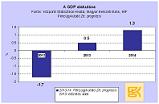The Economic Competition Office?s role in shaping market structure
According to economic arguments, the monopolized enterprise structure inherited from the planned economy acts as an obstacle of market competition, so many of the big, artificially created state-owned firms have to be broken up. The state, through the Economic Competition Office as ?guardian? of competition, has to play an active role in this process. The logic is clear, but it was a matter of dispute both theoretically and in practice. The article presents the theoretical dilemmas of demonopolization that appeared during transformation. It shows the attempts to resolve them through competition regulation and the decisions of the Competition Office. The author concludes that the main role in building up competitive market structure was not played by the Competition Office, which declined the task to revise the inherited structure and to oppose several privatization decisions, considering these issues economically and politically sensitive. On the other hand, most mergers and takeovers connected with privatization were simply permitted not in contradiction with the law but sometimes by inconsistent reasoning.
Közgazdasági Szemle ? Economic Review, LI. évf., 2004. January pp.1 - 23.
Tovább»





